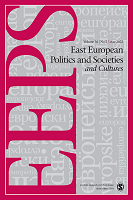Purim Gifts from Russian Neighbors: Prewar Identity Formation and Wartime Survival among Young Jews from Soviet Vitebsk
Purim Gifts from Russian Neighbors: Prewar Identity Formation and Wartime Survival among Young Jews from Soviet Vitebsk
Author(s): Jeffrey KoerberSubject(s): Political history, Social history, Political behavior, Social Theory, History of Communism, History of the Holocaust, History of Antisemitism, Sociology of Politics
Published by: SAGE Publications Ltd
Keywords: Vitebsk; korenizatsiia; Soviet Union; Holocaust; Soviet Jews;
Summary/Abstract: Life under Stalinism in the 1930s challenged Jews, particularly the young, with innumerable compromises to their religious and ethnic identity, yielding unexpected responses during World War II and the Holocaust. This article analyzes how Jewish youth raised in 1930s Vitebsk in the Belarusian Soviet Socialist Republic acquired firsthand knowledge of the language and customs of their Slavic neighbors, and how some of this cohort harnessed their experiences and understanding in their attempts to survive during the Holocaust. Bolshevik policies unique to Soviet Belarus affected its Jews in ways distinct from their counterparts elsewhere in the Soviet Union. Nationalities and religious policies as well as the Five-Year Plans and the Great Terror served as the context for this situation, shaping and distorting transmission of Jewish traditions along with changing the dynamics of the family and social relationships. Young Jews in Vitebsk learned Slavic languages and culture from their neighbors, in Soviet schools, and through other means. After the German invasion in 1941, the application of these skills and knowledge are a common thread through the survival narratives of young Holocaust survivors from Soviet Vitebsk.
Journal: East European Politics and Societies
- Issue Year: 37/2023
- Issue No: 01
- Page Range: 159-181
- Page Count: 23
- Language: English
- Content File-PDF

